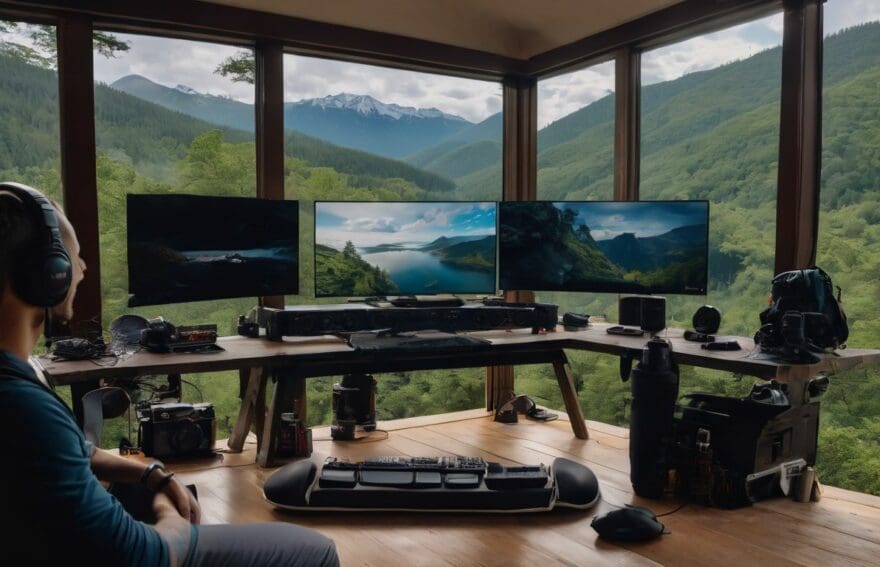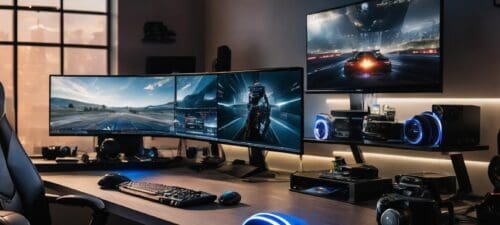Balancing Esports and Personal Life: Tips from the Pros

Updated On: October 24, 2025 by James Connolly
Navigating the thrilling world of competitive gaming can often feel like a high-stakes quest in itself. It’s all too easy to get swept up in endless practice sessions while striving to conquer leaderboards, isn’t it? Yet, we understand that there’s more to life than just epic wins and nail-biting matchups.
Striking a harmonious balance between your passion for esports and the day-to-day is no small feat – but fear not! Our guide is brimming with sage advice from veteran gamers who have cracked this code.
They’ll tell you that pencilling in time constraints for gameplay is absolutely crucial if you’re keen on dodging gamer fatigue. Fancy giving your life skills an upgrade? Stick with us as we delve into manageable strategies destined to keep both your game sharp and personal life buzzing.
Understanding the Importance of Balance in Esports and Personal Life
Balancing esports and personal life is crucial to avoid burnout, set achievable goals, manage time effectively, and take regular breaks. It’s important to strike a healthy balance between gaming and other aspects of life for overall well-being.
Avoiding burnout
We know how intense the world of esports can be. It’s easy to get caught up in endless practice sessions and competitive play, but it’s crucial we set boundaries to prevent burnout.
To keep ourselves at the top of our game without crashing, we must establish strict gaming limits and remember to step away regularly. Taking these breaks not only refreshes our minds but also sustains our passion for gaming.
Maintaining a healthy balance involves juggling responsibilities and prioritising rest as much as practice. We ensure we get enough sleep – it’s non-negotiable for staying sharp both in-game and out.
Integrating physical exercise into our routine isn’t just good for health; it actually boosts performance levels in esports by keeping us physically fit and mentally alert. Embracing this balanced approach means we stay on track with our ambitions while safeguarding personal wellness.
Setting realistic goals
Setting realistic goals is crucial for maintaining a healthy balance between esports and personal life. It’s important to set achievable targets that align with your schedule and commitments.
By setting specific, measurable, and attainable goals, you can track your progress and stay motivated in both gaming and personal responsibilities.
Players should consider their available time for gaming and incorporate breaks to avoid burnout while pursuing their goals. This balanced approach ensures that gamers can enjoy the benefits of gaming while fulfilling other aspects of their lives effectively.
Managing time effectively
To manage time effectively in esports and personal life, it’s important to prioritise tasks and allocate specific time slots for both gaming and personal commitments. Here are some tips to help you manage your time more efficiently:
- Create a schedule that includes designated times for gaming practice, personal activities, rest, and sleep. This will ensure that you have a well-balanced routine.
- Use time management tools such as timers or scheduling apps to stay organised and focused during gaming sessions while also managing other responsibilities.
- Prioritise the most important tasks first, whether it’s practising for an upcoming esports tournament or fulfilling personal obligations, to avoid feeling overwhelmed.
- Set realistic goals for your gaming and personal endeavours, breaking them down into smaller, manageable tasks that can be accomplished over specific periods of time.
- Allocate time for breaks in between gaming sessions to prevent burnout and maintain mental well-being while also dedicating time for exercise or physical activity to stay healthy and energised.
- Regularly evaluate your schedule to identify any inefficiencies or areas where adjustments can be made to improve overall productivity and balance between esports and personal life.
- Communicate with friends, family, or teammates about your schedule so they can understand when you’re available for gaming as well as when you need time for other commitments.
Taking breaks
Regular breaks are essential for maintaining peak performance in gaming and preventing burnout. By setting a timer to remind ourselves to step away from the screen, we can reduce eye strain and potential physical discomfort, while also giving our minds a chance to recharge.
During these breaks, engage in light stretching or take a short walk to keep the body active and prevent stiffness from prolonged sitting. Additionally, grabbing a healthy snack or engaging in a quick chat with friends can offer mental refreshment before diving back into gameplay.
Remembering to take breaks not only helps us physically but also mentally. Stepping away from the game gives our brains an opportunity to rest and reset, ensuring that we come back feeling refreshed and focused on the next challenge without feeling overwhelmed or fatigued.
Tips from Professional Gamers
Professional gamers suggest prioritising regular exercise to maintain physical and mental wellness, setting clear boundaries between gaming and personal responsibilities, and seeking support from friends or professionals when needed.
Click here to read more about how the pros balance their esports career with personal life.
Prioritising exercise
Prioritising exercise is crucial for maintaining physical and mental well-being in esports. Regular physical activity can enhance endurance, focus, and overall performance. It also helps in preventing injuries and improving reaction time. Here are some key ways to prioritise exercise:
- Engage in specific exercises to improve gaming skills, such as hand – eye coordination drills or wrist strengthening exercises.
- Incorporate a variety of physical activities, including cardio, strength training, and flexibility exercises, to maintain overall fitness.
- Schedule regular breaks during gaming sessions to stretch and move around, preventing stiffness and promoting circulation.
- Participate in outdoor activities or sports to balance extended periods of indoor gaming with fresh air and sunlight exposure.
- Seek guidance from fitness professionals or coaches specialised in esports to create tailored exercise routines that complement gaming demands.
Setting boundaries
- Allocate specific hours for gaming and stick to them, allowing time for personal activities and rest.
- Communicate your boundaries with family and friends to ensure they understand your commitments.
- Establish a clear routine for gaming and personal responsibilities to maintain balance.
- Define clear limits for gaming sessions to prevent excessive screen time and prioritise other activities.
- Set boundaries around your practice schedule to avoid overexerting yourself physically and mentally.
Maintaining a healthy lifestyle
Balancing esports and personal life requires maintaining a healthy lifestyle to ensure peak performance and overall well-being. Here are some crucial tips to integrate a healthy routine into your gaming lifestyle:
- Prioritise adequate sleep and rest to support mental clarity and physical health while gaming.
- Incorporate regular exercise into your schedule to enhance stamina, focus, and overall well-being.
- Strive for a balanced diet that includes essential nutrients to fuel your body for rigorous gaming sessions.
- Take regular breaks from gaming to stretch, hydrate, and refresh your mind for sustained concentration.
- Implement stress – management techniques such as mindfulness or relaxation exercises to maintain mental wellness during intense gaming periods.
- Foster social connections outside of gaming by engaging in activities with friends or family members to promote a balanced social life alongside your esports commitments.
- Seek continuous learning opportunities related to nutrition, fitness, and mental health to maintain a holistic approach towards personal wellness while pursuing professional gaming aspirations.
Seeking support
After prioritising exercise and maintaining a healthy lifestyle, seeking support is another crucial aspect of balancing esports and personal life. Building a strong support system can help in managing the demands of gaming and personal commitments.
Surrounding oneself with understanding friends or family members who respect gaming as a serious pursuit can provide vital emotional support. Moreover, joining online communities, forums, or local gaming groups offers opportunities for networking, sharing experiences, and learning from others facing similar challenges.
Seeking professional guidance from mentors within the esports industry can also be invaluable for aspiring gamers. Mentors not only offer advice on improving gameplay but also provide insights into time management strategies and maintaining overall well-being while pursuing an esports career.
The Constant Journey of Balancing Esports and Personal Life
Adapting to the ever-changing demands of esports and personal life can be a constant challenge. It requires regular evaluation and adjustments to find the right balance that works for you.
Adjusting to changing schedules and priorities
- Regularly assess your commitments and adjust your gaming and personal time accordingly.
- Prioritise important events or obligations in both your gaming and personal life to avoid conflicts.
- Consider making a flexible schedule that allows for adjustments based on changing priorities.
- Communicate openly with those around you about any shifts in your availability due to schedule changes.
- Embrace the need for flexibility and adaptability, as it is essential when managing evolving responsibilities.
- Keep an open mind towards reorganising your routine to accommodate new opportunities or challenges.
- Stay mindful of the need for balance amidst changes, ensuring both gaming and personal life receive adequate attention.
Regularly evaluating and readjusting
Evaluating and readjusting our gaming-life balance is essential to ensure we’re prioritising both our personal life and esports commitments. This involves:
- Assessing our current schedule and workload to identify any areas of imbalance.
- Reflecting on how much time we dedicate to gaming versus personal activities, and whether adjustments are needed.
- Seeking feedback from friends, family, or teammates to gain different perspectives on our gaming habits.
- Reassessing our goals and priorities to ensure they align with our overall well – being.
- Modifying our routine and boundaries as necessary based on changes in personal or professional responsibilities.
- Recognising signs of burnout or stress and making necessary changes to prevent them from affecting our performance or well-being.
- Monitoring the impact of gaming on mental health, sleep patterns, and physical well – being regularly.
- Enlisting the support of a mentor or coach to provide guidance in evaluating and adjusting our gaming-life balance effectively.
- Adapting our approach based on new insights or experiences to continually improve our overall well – being while maintaining a successful esports career.
- Embracing flexibility in balancing gaming and personal life, understanding that it’s an ongoing process that requires regular evaluation and adjustment for optimal results.
Impact on Relationships
Maintaining communication and setting mutual boundaries are crucial for balancing esports and personal life. It’s important to find ways to integrate gaming and self-care without sacrificing the relationships that matter most.
Maintaining communication
Communication is vital in maintaining a healthy balance between esports and personal life. Regularly checking in with friends, family, and teammates can help to ensure that everyone understands your schedule and commitments.
This open line of communication fosters understanding, support, and cooperation from both ends. Moreover, discussing any concerns or conflicts openly can prevent misunderstandings and help maintain harmony between gaming and personal relationships.
Remember that setting aside specific times for focused communication is essential – whether it’s discussing game strategies with teammates or spending quality time with loved ones.
Open dialogue promotes a supportive environment where everyone feels valued and heard.
Setting mutual boundaries
Setting mutual boundaries is essential for maintaining a healthy balance between esports and personal life. Clearly communicating your gaming schedule with friends, family, or housemates can help set expectations and avoid unnecessary conflicts.
It’s important to designate specific times for gaming and personal activities so that both aspects of your life receive the attention they deserve without encroaching upon each other.
By establishing clear boundaries, you can protect your personal time while also ensuring that gaming commitments are respected. This approach fosters understanding and support from those around you, promoting harmony between your esports pursuits and personal relationships.
Conclusion
In conclusion, balancing esports and personal life is essential for maintaining well-being and maximising performance. Setting boundaries, taking regular breaks, and prioritising rest are crucial in avoiding burnout.
It’s important to schedule time for both gaming and personal activities to manage time effectively. Remember that finding a healthy gaming-life balance can benefit mental health and cognitive skills.
Lastly, maintaining open communication with loved ones can positively impact relationships while juggling esports and personal commitments.
FAQs
1. How can esports players avoid burnout and maintain a healthy gaming routine?
Esports players can avoid burnout by balancing gaming with exercise, prioritising rest along with practice, and setting boundaries to manage stress effectively.
2. What tips do pros suggest for juggling esports and personal commitments?
Pros recommend finding harmony between gaming and personal life by integrating self-care routines, maintaining work-life balance, and respecting real-life responsibilities.
3. Can you still have a personal life while being part of the esports industry?
Yes, it’s possible to have a personal life in the esports lifestyle by managing your time wisely and finding balance in gaming activities with personal commitments.
4. Why is it important to set boundaries in Esports?
Setting boundaries helps prevent overcommitment, allows for adequate relaxation time away from screens, which is crucial for stress management within both professional athletes’ schedules and those who play games recreationally.
5. How does one find balance between intense practice sessions and taking care of themselves?
Finding balance involves organising your schedule to include consistent breaks for self-care alongside dedicated periods of focused training within the rigorous demands of the competitive gaming industry.








